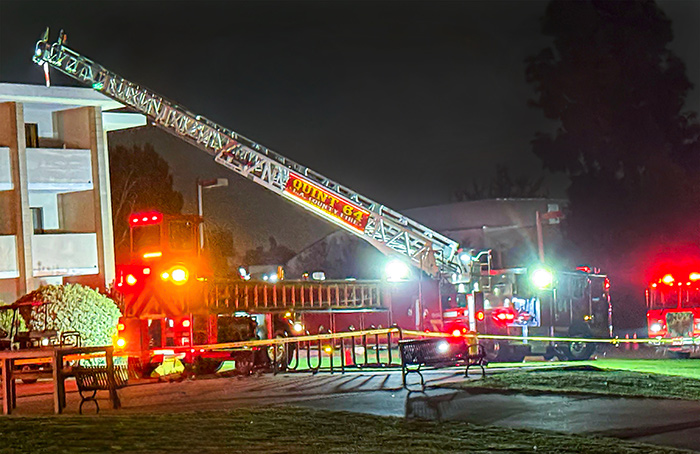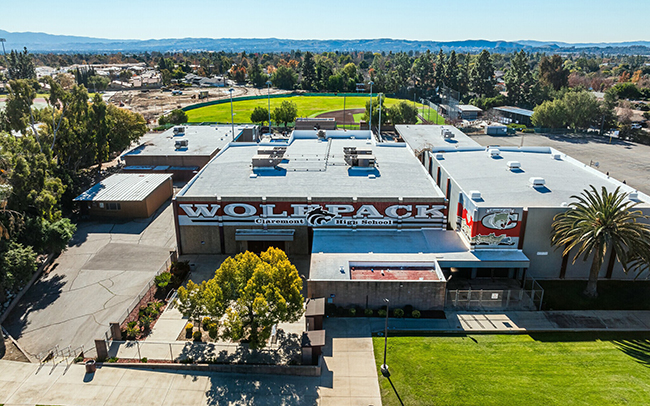City explores water system financing options, final vote in two weeks
Only about 65 Claremont residents showed up at Taylor Hall on Monday night as the Claremont City Council made a major move on the potential purchase of the city’s water system, proceeding forward with financing options.
At a town hall meeting in November, officials estimated that current revenue generated from water could support as much as an $80 million purchase price for the water system. Should the water system and rights value come in higher than $80 million, the city would need to look to bonds to fund the overage. This week, the council unanimously agreed to explore the possibility of obtaining a voter-approved revenue bond if, indeed, the purchase is deemed more expensive. Obtaining such a bond would require the city to hold an election and receive a majority vote of 51 percent in favor of the decision.
The council has not committed itself to the revenue bond. Tuesday night’s decision was only to direct staff to prepare the information necessary to explore this option. Council members were presented with three financing options: a community facilities district special tax bond (requiring a two-third vote of the people), a voter approved water revenue bond, or an installment purchase water revenue bond (which would not require an election, merely a vote from the council). All three financing options would have a similar impact, legal counsel relayed, with an average $21-$23 added to water bills for single-family residences per month for an estimated 30 years.
The community facilities district special tax bond was quickly ruled out because—as several attendees pointed out—schools, colleges, churches and retirement communities are all exempt from this tax. While many spoke in favor of the city’s choice to take their time throughout the process of exploring water system acquisition, several urged the council to go with the quicker route of an installment purchase water revenue bond.
“We would do well to avoid an election, both for cost and the divisiveness of another forum for Golden State to continue the tactics that they have done thus far and clearly will continue throughout this entire process,” said Claremont resident Anne Turner.
A couple residents, however, were uncomfortable with having five people make the sole decision on such a large, controversial topic as the purchase of the water system. While Mayor Joe Lyons was vocal in his preference to not go with an election, he conceded to the council’s will, which was to leave the final decision to the people.
“I believe there will be acrimony no matter what we do,” Mayor Pro Tem Corey Calaycay said. “But I do believe…any issue [on the acquisition] should go to the vote of the people.”
Council water action trickles forward
While advancing with financing options, the Claremont City Council unanimously opted to postpone the adoption of a final report evaluating the environmental impacts of a water system purchase for two weeks.
The recommendation to delay the final decision was made by City Attorney Sonia Carvalho, who said she wanted to give the city’s legal team time to address any additional questions on the report.
At the town hall in November, city officials approved the use of $350,000 in city funds to prep financial and legal documents needed for the potential purchase of Claremont’s water system, including the environmental report. While it was not determined that the potential water system purchase would have a significant impact on the environment, the city made the choice to move forward with a more extensive review process “to show the city’s due diligence,” said Michelle Ouellette, an environmental law attorney hired by the city of Claremont.
Public review of the initial study began on November 21 with a community meeting held in December. A public comment period was again initiated after the final report on January 24. Six letters with comments on the report were received, one from representatives of Golden State Water Company, owners of Claremont’s water system.
A majority of the complaints received were minor and the overall tone of correspondence was positive, Ms. Ouellette alleged. Bryan LeRoy, an environmental lawyer who spoke on behalf of Golden State, asserted the report was far from adequate. Filing an environmental impact report before the city has identified a water system operator is backwards, he said. The city’s report indicates the possibility of Pomona, Upland, the Monte Vista Water District or another private third party operator serving as Claremont’s water system manager. The city is currently working with the city of La Verne to conduct a feasibility report on joining forces with their water works department. Nothing has been finalized.
“The operational study is key, with details on how the system will operate and what may happen down the road,” Mr. LeRoy said. “How can you commit to a course of action when you don’t even know the manager yet?”
Mr. LeRoy went on to criticize the city’s failure to explore the impact of potential future reclaimed water use, which is mapped out in the city’s Sustainability Plan.
Dr. Rodney Smith, a local water consultant hired by Golden State Water to conduct a feasibility study of the water system, accompanied Mr. LeRoy. Dr. Smith also spoke at the meeting, maintaining that the acquisition would result in “higher rates indefinitely if the city attempts an eminent domain takeover.”
The city’s appraiser has conservatively estimated the city could afford up to $80 million with little to no impact to existing water rates and without resorting to a water bond or parcel tax. Even if the water system purchase were to cost $100 million or $120 million, city experts estimate rates would still be lower than existing Golden State Water rates in 9 or 17 years, respectively. Information supporting those numbers has been withheld from public viewing at this time because of the city’s ongoing legal battle.
The city’s refusal to release this feasibility study has been a source of contention between the city and the water company, which filed a lawsuit in December to require that city officials make the document available for public viewing. Claremont administration continues to advocate its right to privacy because of the legal battle that may commence for the purchase of the water system.
The city has made offers of $54 million and $55 million, respectively, to Golden State for the purchase of the water system. Both have been turned down as Golden State representatives maintain the system is not for sale and estimate the system’s value is closer to $200 million.
Claremont resident Valerie Martinez, who provided environmental report consulting, refuted Golden State’s rejection of the city’s environmental report, saying she was impressed with the thoroughness of the city’s process.
“They didn’t have to conduct an Environmental Impact Report, but they did to make sure they really dotted the Is and crossed the Ts,” Ms. Martinez said. “If I were their lawyer, I’d probably be saying the same thing. They are just doing their job. But as a community, we need to do our job, educating ourselves and supporting our council in this effort.”
—Beth Hartnett
news@claremont-courier.co










0 Comments